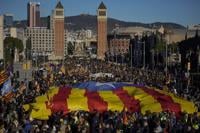ATLANTA (AP) — When police stormed an Atlanta-area music festival two days after a rainstorm, they were looking for suspects wearing muddy clothing.
Authorities moved in on the South River Music Festival on the evening of March 5, over an hour after more than about three-quarters of a mile (1.2 kilometers) away, bashing equipment, torching a bulldozer and a police ATV, while throwing rocks and fireworks at retreating law enforcement officers, according to police surveillance footage.
Officials say many of the rioters trekked back to the festival ground, crossing a creek before changing out of their all-black or camouflage attire in the woods in order to blend in with the hundreds of peaceful concertgoers gathered to show their solidarity with the “Stop Cop City” movement — a decentralized campaign to halt the planned razing of an urban forest for the construction of a huge police and firefighter training center.
By the end of the night, 23 had been arrested, each facing between five and 35 years behind bars on domestic terrorism charges, even though none of the warrants accuses any of them of injuring anyone or vandalizing anything.
Civil liberties groups and defense attorneys say officials levied the disproportionate charges to scare off others from joining a movement that has only grown since January, when a was killed by a state trooper as authorities cleared activists from the South River Forest. Authorities said they fired in self-defense after the protester shot a trooper, but and called for an independent investigation.
Officials say the protesters have attacked officers, destroyed property and , causing terror in the community.
“You can’t make a criminal organization out of a political movement,” said defense attorney Eli Bennett, representing three people who were arrested at the festival. “That’s just not what we do in this country, I hope.”
Following the arrests, numerous activists told The Associated Press that they fear being detained on flimsy charges that could have huge ramifications. But they are committed to ensuring that what they refer to disparagingly as “Cop City” will never be built.
“If I am arrested with domestic terrorism charges for camping in a forest, that’s something I’m willing to go to court for," said Sam Law, an anthropology doctoral student from Texas. "If I have to spend a few weeks in jail, that sounds like a deeply unpleasant experience, but I don’t think it’s a reason not to stand with other people of conscience doing what I feel like the historical moment calls us to do.”
Vanderbilt University law and political science research professor Samar Ali said domestic terrorism charges should be reserved for heinous crimes such as the 1996 Oklahoma City bombing, and that Georgia authorities' use of such harsh laws only fans the flames of distrust between activists and authorities.
If the prosecutions succeed, Ali predicted, conservative states could replicate Georgia’s broad domestic terrorism statute and target left-wing movements, while liberal states could take a similar approach against white nationalists, further increasing division in the country.
“This is going to be a test case in terms of an application against environmental activists,” Ali said. “If there is a harsh sentence against environmental activists, we are likely going to see replication of this across states.”
In their arrest warrants, police allege 17 of the 23 suspects wore muddy clothing and carried shields — evidence that they were among the band of violent protesters and not mere festivalgoers. But the warrants for five of the other suspects do not list any specific details to explain why they were arrested.
One of the defendants, a Southern Poverty Law Center legal observer accused because of their muddy clothing, was released on bond a few days later. Fourteen other defendants spent at least two weeks in jail before being granted bond, while eight were denied bond Thursday.
Bennett said none of his clients had shields despite the warrants' claims. He said it's ridiculous to call muddy clothes evidence of wrongdoing, given that it had rained that week and there were many muddy patches around the festival site, including by the stage where festivalgoers had been moshing to punk music.
“I understand law enforcement has a big problem on their hands in identifying the actual ‘vandals’ here,” Bennett said. “But that doesn’t justify arresting people who had no involvement and were just there for a music festival that was in support of an environmental cause and an anti-militarization of the police cause.”
Atlanta police declined to comment on how many shields were recovered and where and when the arrests occurred, though jail records say all 23 were arrested at 7:45 p.m., more than two hours after Atlanta Police Chief Darin Schierbaum said the violence took place.
Ever since City Council approved the $90 million training center in 2021, the movement has brought together a whole host of leftists, including environmentalists and police abolitionists. They say officers at the 85-acre (34-hectare) center would be trained to become more militarized and quell dissent, all while hundreds of trees are cut down, damaging the climate and flood mitigation in a poor, majority-Black neighborhood.
Officials counter that the state-of-the-art campus would replace substandard offerings and boost police morale beset by hiring and retention struggles following violent protests against racial injustice after George Floyd's death in 2020.
Georgia’s domestic terrorism law originally applied only to crimes that were “intended or reasonably likely to injure or kill not less than ten individuals.” But state lawmakers broadened the law in 2017, removing the 10-victim threshold and adding attempts to “disable or destroy critical infrastructure” with the intent to “alter, change, or coerce the policy of the government.”
For more than five years, the statute was rarely employed. That changed in December, when six self-described “forest defenders” were removed from the training center site. Since then, 35 other alleged members of the movement have been jailed on the charge, including seven who were arrested during the clearing operation when authorities killed Tortuguita, whose given name was Manuel Paez Terán.
Four days after the festival, dozens of activists remained in the nearby woods. Some were cleaning up trashed campsites, while others prepared lunch. The activists insisted they had the moral high ground and would not back down to “heavy-handed” police tactics.
Some conceded that facing a domestic terrorism charge could have huge personal implications.
Kira, an Atlanta-based technical writer who has served as a medic during “Stop Cop City” demonstrations, said she does not engage in violence, and that a domestic terrorism charge could ruin her career, even if it is later dropped. She left the festival after she heard that officers were on their way.
“My instincts told me, ‘OK, it’s time to get out,'” Kira said. “I'm middle-aged. I have a good job. I would take an arrest if I feel that it’s justified but I'm not going to get arrested out of collateral damage."
Ashley Dixon, a local organizer with Showing Up for Racial Justice, said she and her friends didn't realize the vandalism was going on and that she was shocked to see an officer holding a weapon running toward her.
“The officer tased someone right in front of me," Dixon said. "I heard him yelling something, but I don’t know what he was yelling because I was in fight-or-flight mode. I was in fear for my life and I just kept running.”
But fear of being charged won't stop her activism.
“If anything, it makes me want to fight harder because it just seems that much more important,” Dixon said. "If they’re already using this level of violence against protesters now, imagine what they will do if they have this militarized police training center.”














































